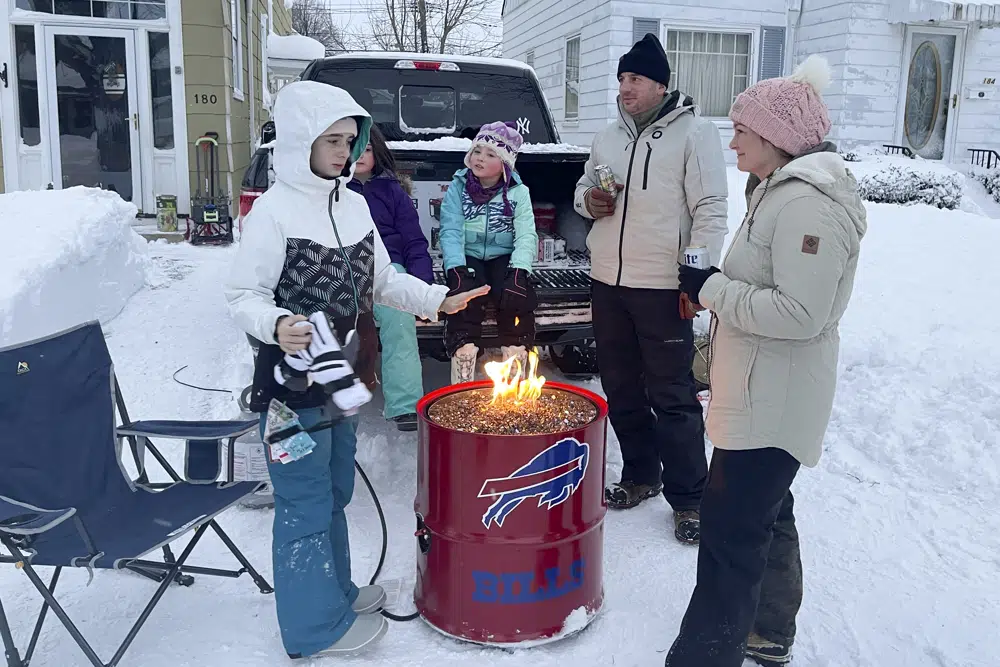Military police enforces driving ban in snow-choked Buffalo, New York

Buffalo, The Gulf Observer: State and military police were sent Tuesday to keep people off snow-choked roads of Buffalo, and officials kept counting fatalities three days after western New York’s deadliest storm in at least two generations.
Amid some signs of progress suburban roads reopened and emergency response service was restored County Executive Mark Poloncarz warned that police would be stationed at entrances to Buffalo and at major intersections to enforce a ban on driving within New York’s second-most populous city.
“Too many people are ignoring the ban,” Poloncarz, a Democrat, said at a news conference.
The National Weather Service predicted that as much as 2 inches (2.5 to 5 centimeters) more snow could fall Tuesday in Erie County, which includes Buffalo and its 275,000 residents. County Emergency Services Commissioner Dan Neaverth Jr. said officials also were somewhat concerned about the potential for flooding later in the week, when the weather is projected to warm and start melting the snow.
The rest of the United States also was reeling from the ferocious winter storm, with at least an additional two dozen deaths reported in other parts of the country, and power outages in communities from Maine to Washington state.
On the Rosebud Sioux Tribe’s reservation in South Dakota, there were plans to use snowmobiles Tuesday to reach residents after food boxes were delivered by helicopter and trucks over the weekend, the tribe said.
In Buffalo, the dead were found in cars, homes and snowbanks. Some died while shoveling snow, others when emergency crews could not respond in time to medical crises. Poloncarz called the blizzard “the worst storm probably in our lifetime,” even for an area known for heavy snow.
The winter blast stranded some people in cars for days, shuttered the city’s airport and left some residents shivering without heat. More than 4,000 homes and businesses were still without power late Tuesday morning.
Trisha LoGrasso and her family were still huddled around a space heater in a makeshift hut in her Buffalo living room Monday. She was without heat because of a gas leak, the temperature inside the home was 42 degrees (5.5 Celsius), and burst pipes left her with no running water.
“I’ve lived here my whole life, and this is the worst storm I’ve ever seen,” said LoGrasso, 48.
President Joe Biden offered federal assistance Monday to New York, while Gov. Kathy Hochul toured the aftermath in Buffalo, her hometown, and called the blizzard “one for the ages.” Almost every fire truck in the city became stranded Saturday, she said.
Hochul, a Democrat, noted the storm came a little over a month after the region was inundated with another historic snowfall. Between the two storms, snowfall totals are not far off from the 95.4 inches (242 centimeters) the area normally sees in an entire winter season.
The National Weather Service said the snow total at the Buffalo Niagara International Airport stood at 49.2 inches (1.25 meters) at 10 a.m. Monday. Officials said the airport will be shut through Wednesday morning.
More than 2,900 domestic and international U.S. flights were canceled Tuesday as of about noon Eastern time, according to the tracking site FlightAware.
The U.S. Department of Transportation said it will look into flight cancellations by Southwest Airlines that left travelers stranded at airports across the country amid the winter storm. Many airlines were forced to cancel flights, but Southwest was by far the leader.


